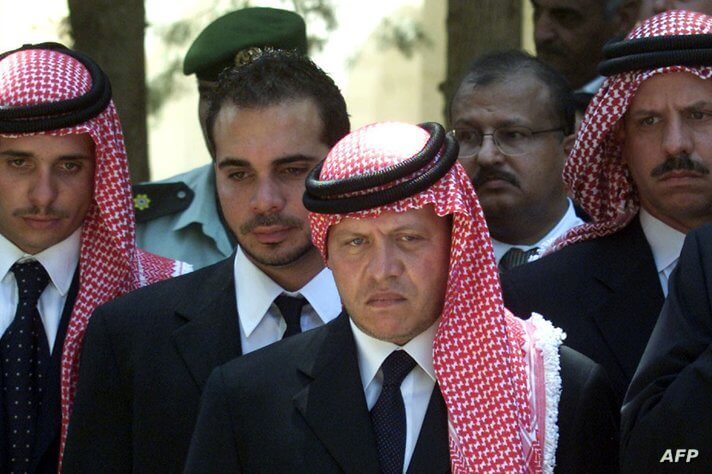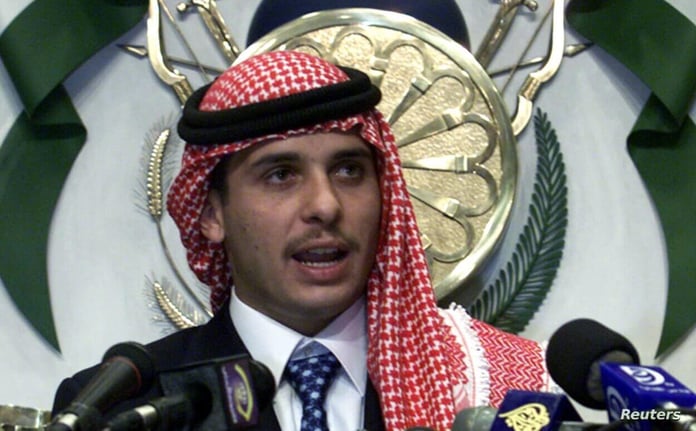More than a year after its beginning, the “issue of sedition” in Jordan returned to the fore, with the latest repercussions restricting the contacts and movements of Prince Hamzah, the half-brother of the Jordanian monarch, King Abdullah II.
While observers see the message sent by the King to the Jordanians, Thursday, turning the page of what was known as the case of sedition, there are those who believe that it brought the issue into a new twist.
The roots of the case go back to April 2021, when the Jordanian government accused Prince Hamzah of being involved in and participating in schemes aimed at destabilizing Jordan’s security and the regime, she said.
And King Abdullah II said, in a letter he sent to the Jordanians, on Thursday, that he “has decided to accept the recommendation of the council formed under the Royal Family Law, to restrict Prince Hamzah’s communications, residence and movements,” noting that his brother “lives in a state of mind that has made him lose the ability to distinguish reality from fiction.”
Also Read: The US supports the king of Jordan as his brother in house arrest for “attempted coup”
He added, “My little brother will continue to live in a state of mind that has made him lose the ability to distinguish reality from fiction. At that time, I also realized the difficulty of dealing with a person who sees himself as a hero and a victim at the same time.”
The council, formed under the royal family law, includes Prince Ali bin Al-Hussein as president, and the membership of the Jordanian Prime Minister, Bishr Al-Khasawneh, the President of the Court of Cassation, Muhammad Al-Ghaz, the Minister of State for Prime Minister Affairs, Ibrahim Al-Jazi, and the Chief Justice, Abdul Hafez Al-Rabtah.
Prince Hamzah had sent conflicting messages to his brother, King Abdullah, since the beginning of this year. In March, he apologized for what he had done, and pledged not to repeat what happened. Less than a month later, he returned to announce his abandonment of the title of “Prince”, indicating that his personal convictions are not in line with the approaches, trends and modern methods of state institutions.
Restriction of freedom
The former head of the Jordanian royal court, Jawad Al-Anani, believes that the king’s statement, in which he revealed, on Thursday, what was going on within the royal family in dealing with the prince, sends messages to Jordanians “to control and end matters”, especially in light of the continuing repercussions of the sedition issue.

Also Read: Jordan… “Prince Hamzah” tops “Twitter” after giving up his title
The writer and political analyst, Malik Al-Athamneh, pointed out that “the restriction on freedom approved by the Royal Family Council is nothing but a legal adaptation related to the law of the royal family, which means restricting the means of communication available to the Emir, restricting his movements and limiting them to his residence.”
He explained, “This does not mean that the emir will be in a prison, but he will not get the same freedom that he enjoyed previously, especially with regard to his external contacts, and that a restriction on his movements will be applied to him through law enforcement agencies and the judicial police.”
Al-Athamneh, who resides in Belgium, told that this decision is not new and that “the king was seeking to end the crisis within the royal family, as the recommendation of the council formed under the royal family law dates back to December 2021.”
Al-Athamneh recalled that “a special session was held on the sixth of last March, between King Abdullah and Prince Hamzah, in the presence of Princes Faisal and Ali, where the King sent a letter to the Prince in which he responded to many of the Prince’s proposals, and it was He bore a large part of the blame for what the emir had done, as a road map was agreed upon at that time to deal with the course of affairs, but weeks later the emir came out to announce that he had relinquished his title.
For his part, the political analyst, Nasir al-Omari, said that the king’s message “has a dismemberment and assassination of the prince’s personality… as it contains a lot of convulsions, and it is clear that there is nervousness in describing Prince Hamzah as unbalanced and breaking covenants.”
Al-Omari, who is residing in the United States, added, “The King knows perfectly well that Prince Hamzah is called in the Jordanian street the title of Prince of Hearts, and he is close to the pulse of the street, and he is currently suffering what Jordanians are suffering, as there are dozens of prisoners of conscience in the country, and he also suffers from corruption.” Which the emir complained about when he held the king responsible for corruption and slackness in the state.
[adrotate banner=”5″]
Washington visit
The royal message came about a week after King Abdullah II’s visit to Washington, during which he met with US President Joe Biden, and discussed a number of regional issues of concern to the Middle East.

On the other hand, Jawad al-Anani does not see a connection between the date of the decision and the recent royal visit to Washington, as it is an internal matter of the royal family, and all that concerns the United States is maintaining the stability of Jordan as a key ally in the Middle East, which was clear in the official statements issued. From the White House, he talked about regional projects that contribute to the stability of the region, he said.
Prince’s behavior
In his message, King Abdullah II said that “after a year and a half” the prince “exhausted all opportunities to return to his senses”, as he “ignoring all facts and conclusive evidence, and manipulating facts and events to reinforce his false narrative. Unfortunately, my brother truly believes in what he claims. The delusion he lives is not new”.
Al-Athamneh indicated that he was “surprised by the behavior of the prince, who was crown prince at an earlier time, and he knows perfectly well that what he did violates the law and the constitution.”
He added that the prince’s behavior revealed either “that he is in an abnormal state, or that he has a specific strategy for a political project that he aspires to, as he had pledged to abide by a roadmap with his brother the king, but he returned and repudiated it.”
Is the crisis unfolding?
In his message, the king said that Jordan “does not have the luxury of time” to deal with the “narratives” of the emir, as the state has “many national priorities and challenges that we must confront quickly and firmly.”
[adrotate banner=”5″]
Al-Anani believes that the king wanted to “close the issue of sedition” through a letter in which he revealed to them the course of the royal family’s dealings with the emir.

He stressed that the Hashemite royal family usually keeps dealing with disputes within the family, regardless of the size of the dispute, recalling the historical context of the mandate when the late King Hussein bin Talal sent a message to his brother Prince Hassan after removing him from the throne, and delivered it to his son, Prince Abdullah at the time.
Al-Anani pointed out that what distinguished the dispute with Prince Hamzah was the presence of external parties that were seeking to influence the course of affairs.
In turn, the writer Al-Athamneh asserts, “The king’s message and the restriction of the prince’s freedom will not end the crisis in Jordan, and that the matter will only be resolved by restoring the state and its institutions and closing the doors of populism to everyone, and for the prince to turn into a citizen who does not have any privileges and transfer him to a legal trial, to hear his point of view.”
He explains that “King Abdullah and the Jordanian state apparatus are in a state of rotation and review of decisions, to protect the state, as it cannot be forgotten that the king personally was defending and protecting in the name of Awad Allah associated with the issue of sedition.”
Al-Omari political analyst believes that what happened with Prince Hamzah has boosted his popularity, and that it is clear that he “leads the opposition” in Jordan, which is “a strange thing”, pointing out that the recent constitutional amendments in Jordan made “the king at the head of the executive authority.”
[adrotate banner=”5″]
He believes that the royal message drew “a dividing line between a corrupt approach and an approach that calls for reform, expressed by Prince Hamzah.”
In an interview, political analyst Zaid Al-Nawaisah said, “We hope that the file of sedition has been closed in Jordan, but ending the file is linked to Prince Hamzah’s will and desire, and he is required to resort to the Jordanian constitution, which defines the roles of members of the royal family.”
Also Read: Jordan’s absence from the Sharm el-Sheikh and the Negev summits… Exclusion or self-distancing?
He stressed that “all the princes, including Prince Hassan bin Talal and Prince Hashem, the brother of Prince Hamzah, support the decision of the Family Council and what King Abdullah agreed to.”
In 1999, King Abdullah named his half-brother, Prince Hamzah, the crown prince at the request of his father, the late King Hussein, and in 2004 Hamza was removed to name Prince Hussein, son of the Jordanian monarch, in 2009, the crown prince.
Last July, the State Security Court issued a 15-year prison sentence against the former chief of the royal court, Bassem Awadallah and Sharif Hassan bin Zaid, in the sedition case, after convicting them of opposing the regime and causing “sedition.”


